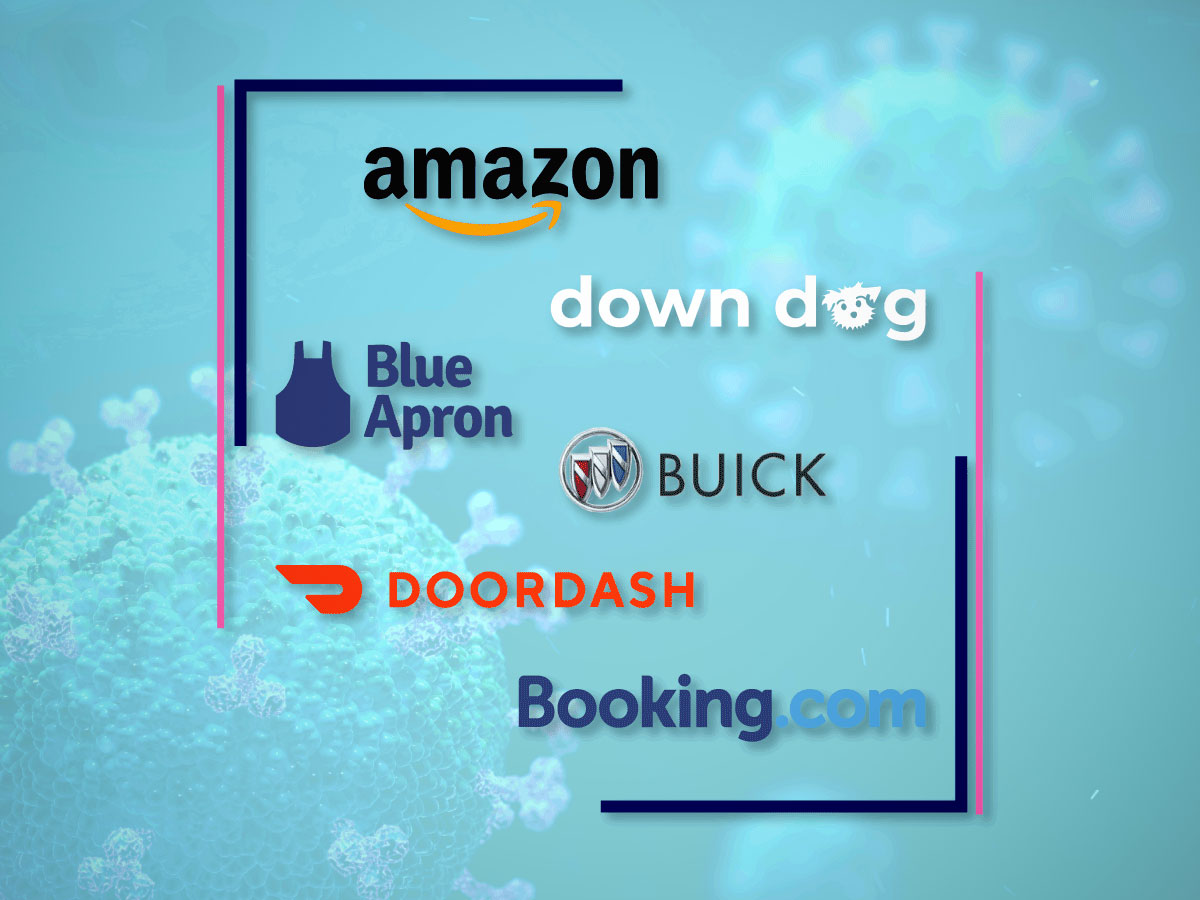

As the world continues to deal with the coronavirus outbreak, businesses are trying to keep up with the fast-changing needs of their customers. Airlines and hotels are managing a flood of cancellations, restaurants are shifting business models, and many CPG brands are ramping up production to meet the dramatic increase in demand.
So exactly which companies are rising to the occasion? We asked LRW’s team of marketing and branding consultants to identify the brands and businesses that are delivering exceptional customer service, striking the right tone in their communications, giving back to the community, or doing anything else to stand out during this tumultuous time. Here are 15 brands that have caught their eye (in alphabetical order).
I think Amazon is doing an excellent job of dealing with the challenges because they have paused all “non-necessary” shipments but do not have a hard ruling on what is “necessary,” so many items are still available. They are also hiring 100,000 new employees to not only help with higher demands for shipping, but also to help the economy and people who have had to unfortunately lose their jobs due to COVID-19.
Jessica Rollins, Research Associate
As more people are working from home, time once filled with long commutes has been freed up for entertainment and media. Many streaming services have risen to the challenge! Disney+ releasing Frozen 2 three months early as families adjusted to sudden school closures, Amazon Prime streaming recent movie theater releases such as Emma and The Invisible Man, and Hulu adding a live news stream for cord-cutters are only three great examples. Netflix also launched Netflix Party, a free service for users that mimics a group movie night by synchronizing video playback and offering group chat capabilities.
Special kudos also to Netflix, whose CEO has announced the launch of a $100M relief fund for production professionals who lost their job due to the COVID-19.
Diana Akimoto, Marketing Communications Manager
They received a ton more subscriptions now that people are more likely to be sheltering in place. Instead of turning these away, Blue Apron changed their operations/fulfillment strategy to be able to meet more requests even when that meant limiting the types of offerings/recipes as well as changing delivery and some requests from existing subscribers. They’re focused on utilitarian options that are both encouraging and community-oriented.
Madeleine Chansky, Research Director
Booking.com promptly waived their policy on my prepaid no-cancellation reservation for a holiday apartment rental. They responded to my request within 24 hours and granted me a full refund. The quickness with which they instituted their policy and acted on it was remarkable. I’ve always been comfortable with Booking.com. My perceptions of the brand increased on trust, fairness, reliability, safety, and security. Customer service at its best.
Matthew Parsons, General Manager
The “We’re Here to Help” ad from Buick subtly acknowledges how suddenly many people’s worlds have turned upside down, delicately raises people’s need “to feel safe” and doesn’t hard-sell a car while acknowledging that you may need one, so they offer “help” via extended 0% financing, online buying, and delivery. While they are not the only auto manufacturer making similar moves, the creative execution was spot-on, with a very soothing, calm tone throughout.
Hilary DeCamp, Chief Research Officer
Chownow is actively advocating through email campaigns and mobile notifications for local businesses that are still open for pickup around peak meal times. It has helped to give consumers confidence that they can choose to help the local economy without endangering themselves, others, or food couriers (since Chownow is pickup only).
Jeff Kaemmerling, Sr. Research Manager
These companies have signed a pledge to keep America internet-connected for the next 60 days, even if people cannot afford to pay. I think this is a great example of customer service, because millions of Americans are forced to work from home and most (if not all) of those people depend on an internet connection to get their jobs done. This will allow Americans to stay productive, maintain communication, and hopefully make the transition to living mostly indoors a little easier.
Blair Coughlin, Research Associate
I have been receiving continuous update emails from DoorDash regarding their new policies as the COVID-19 news changes. Their dedication to helping the restaurant business is impressive by waiving some of their commission fees. DoorDash has even posted supporting their rival delivery companies. I personally haven’t used them (or any other delivery service) during these times, but they’ll certainly be first on my list when I do. A company that cares about humanity over greed means a lot to me.”
Maritza Flores, Administrative Assistant
Down Dog has made all of their apps (Down Dog, Yoga for Beginners, HIIT, Barre, and 7-Minute Workout) free to everyone in the community through April 1. On top of this, they’re extending free access through July 1 for all students, teachers, and healthcare workers. I think their efforts to promote a healthy lifestyle across the entire community without taking a profit are really admirable.
Natalie Brink, Executive Director, Global Data Collection
Grubhub is thinking big-picture on the unique impact they can have during this time and building their brand as one that cares about the communities where they operate. They’ve deferred commission fees for restaurants so that more money from delivery orders will go directly to those restaurants and have set up a fund to support restaurant workers.
Liz Reamer, Research Director
Joann’s is staying open where states have a stay-at-home policy because they are considered an essential store. Why are they essential? They sell fabrics and crafts, but our world as it is today needs FABRICS and CRAFTS. They are working with hospitals to supply materials and working with volunteers who can sew/create masks, bedding, etc. They are giving volunteers “take and make” bags for those who want to help and sew, but want to do it at home.
Nicole Hauptman, Account Relationship Manager
Grocery stores and their workers have been amazing. They’ve taken on the role of emergency responders and are doing their best to keep shelves stocked, working extra hours to clean their stores, and they’re even hiring additional staff to meet current demands. They’ve opened up special hours to give the elderly and those with health issues priority access to their stores before household essentials become unavailable. They expose themselves to the risk of contracting COVID-19 by opening their doors to the community. Their willingness to put themselves in harm’s way in order to provide much needed services to the community is nothing short of heroic.
Lowell Abellon, Sr. Visual Brand Manager
Lyft’s email was one of dozens that I received from brands responding to COVID-19. They weren’t unique in expressing their concern, though they did so with empathy. What impressed me was the obvious thought they put into assessing their position in the crisis, and pivoting their services in a way that makes sense and provides relief. Drivers, riders, and others who depend on the Lyft network are looking to it for different reasons, and Lyft indicated they’re working to understand what essential services are needed for each and will shift its business accordingly.
Michelle Hinojosa, Insights Director
They’ve not only made deliveries free, but they’re opening outposts at any place where healthcare workers are stationed to help bring them meals while on the job. They started this over a week ago, swiftly rising to the occasion.
Hillary Stabelfeldt, Sr. Manager, Global Data Collection
In addition to providing free delivery for their delicious salads, Tender Greens is also offering grocery boxes that can be delivered or picked up at their California locations. Several boxes include two rolls of coveted toilet paper as well as fresh produce. This is a great way to quickly pivot their business at a critical time when consumers want groceries delivered more than ever but struggling to secure grocery delivery through typical outlets, like Instacart and Prime Now due to increased demand.
Melissa Kerley, Sr. Research Manager
You must be logged in to post a comment.